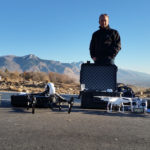Surveillance Drones on the Homefront
The somber warning of Orwell’s dystopian 1984 may have seemed to pass with the fall of the Soviet Union, but many Americans have begun to fear that their free, democratic country isn’t as free and safe as it used to be. The birthplace of the unmanned aerial vehicle, or more ubiquitously referred to as the drone, saw its emergence on the battlefields of the War on Terror. While drone usage overseas still poses a significant debate for politicians and civilians to look at, UAVs have begun their migration to American shores. Police units throughout the states have begun receiving military technology from the armed forces as they move out of the Middle East. Among the various military hardware that the police have begun outfitting themselves with, the use of surveillance drones generates a significant amount of concern from civilians. Weaned on cautionary tales against dictator states such as Orwell’s Oceania, American citizens cannot be faulted for mistrust of surveillance drones supposedly peering into every facet of their private lives. Much of the distrust towards police usage of drones, however, stems from a misunderstanding of the usage of drones as well as the current battles being fought over their usage.
The drones that may soon soar through America’s skies likely won’t resemble the large, fixed-wing aircraft such as the Predator or Reaper classifications of military drones. Rather, police drones resemble the remote aircraft many hobbyists use already. However, these civilian RC drones are already largely mistrusted by the public, with cases of drones being shot down or their pilots being assaulted. The populace has grown increasingly wary of camera evidence in the increasingly digital information age, with civilian cameras capturing at high enough resolutions to make the height at which drones can travel a non-issue. Additionally, public sentiment doesn’t know how to deal with drones. Someone using a smartphone camera to record their dog playing in the park is completely normal. If the person were to use a drone-mounted camera, public opinion towards their action suddenly becomes far more convoluted.
Compounded with the current anti-police sentiment America faces following events such as Ferguson, police usage of drones has been met with significant resistance throughout the states. Recently, Assembly Bill 1327 in Los Angeles justified the use of drones by the LAPD by regulating when and how officers use the device and store data. Protesters formed outside the city hall, decrying the legislation. The LAPD had received two Draganflyer X drones from Seattle police, who were forced to give up the drones after residents refused the usage of drones. Currently, the two drones are locked up and grounded due to the public outcry. One protester argued that “the waivers and exemptions [in the bill]…they’ll become bigger and bigger.” The storage of data also represents a potential problem for lawmakers to confront. The digital era makes fully deleting all records of police imagery captured through drone cameras extremely difficult. Additionally, the storage of high-resolution images is quickly becoming a non-issue, as digital storage continues to grow exponentially. The civilian concern about the use of drones is valid. Without regulation, police could easily use drones to peer into windows and effectively negate the expected right to privacy in homes.
The loss of American privacy shouldn’t have become an issue simply because the technology is now physical, however. For the past decade, Americans have willingly submitted terabytes of their own information to corporations and the like. For instance, the utilization of Google Maps traffic feature, which allows smartphone users to see whether their planned commute will be laden with traffic, involves Google tracking smartphone users as they travel throughout the city. GPS services themselves can capture clear images of streets and buildings from a perspective up in orbit. The United Kingdom, one of America’s stalwart defenders of democracy, utilize cameras throughout their streets to monitor potential crimes. The constant digitization of data has been an issue since the world has entered the information era, and as technology evolves, the possibility of preventing it seems more unlikely. Additionally, one must weigh the negatives against the positives of digitization. Services provided by Google create a significant quality of life improvement, and the availability of data through the internet essentially creates a plethora of information at one’s fingertips.
Drones could potentially be a major boon to police operations. Real time intelligence about dangerous, rapidly evolving situations such as hostage situations, mass shootings, or major fires could have the potential to save human life on a massive scale. Utilization of drones in police patrols could also save manpower, effectively cutting down on the budget.
Ultimately, however, drones are a tool. They aren’t a malignant infestation, ready to watch the masses collectively use the toilets. If an individual wishes to invade another’s privacy, they can already do so without the use of drones. Resisting technology simply to avoid an issue is only a temporary solution. Rather, finding ways to redefine America’s laws to acquiesce for the information era will hopefully allow these powerful tools to be effectively integrated into American society.


